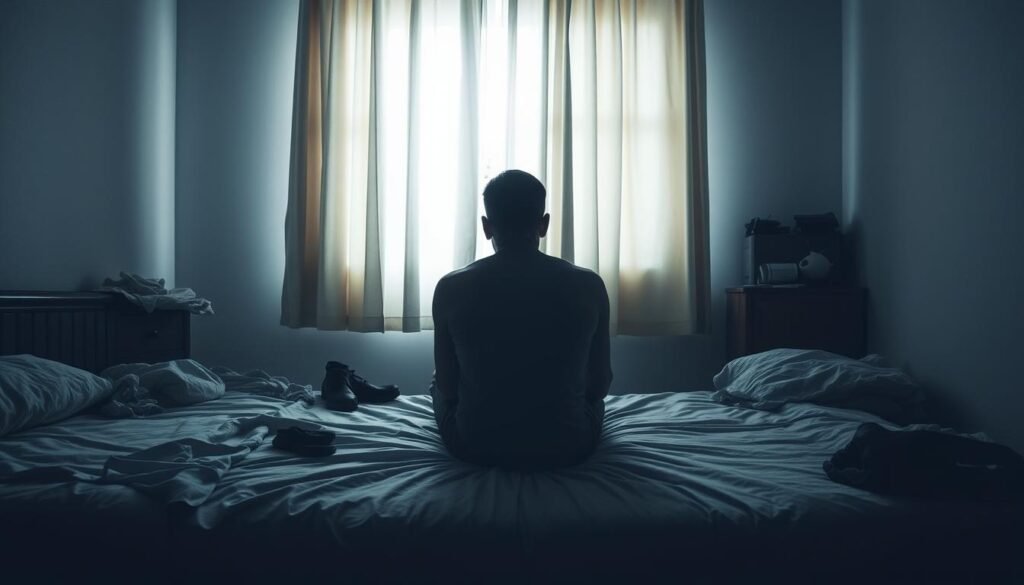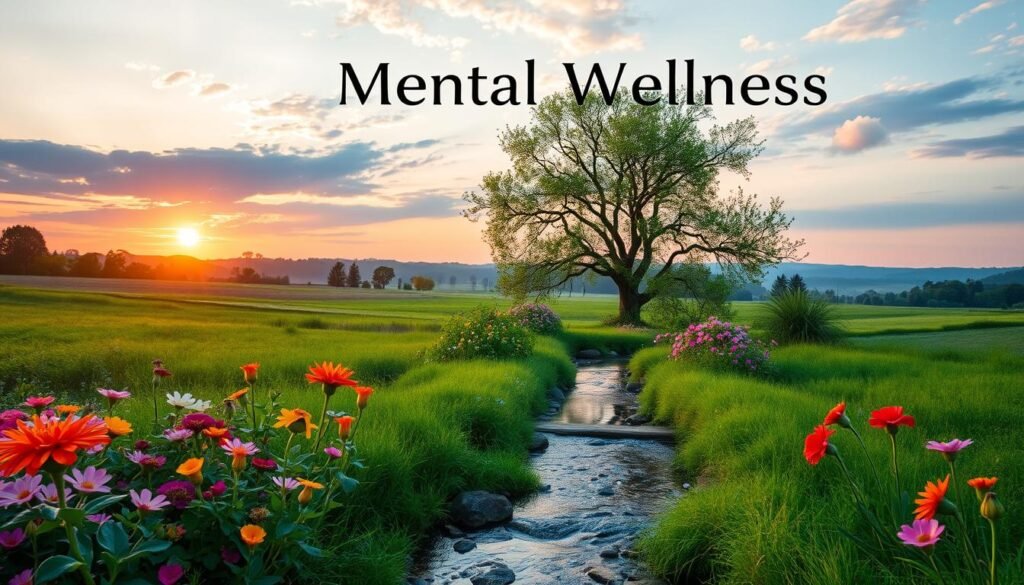It’s important to know the signs of depression to keep our mental health in check. Depression shows up in many ways, but knowing the key signs can help us spot it early. This article will cover the different signs of depression, helping you understand this common mental health issue.
By paying attention to the signs of depression, we can help ourselves and our loved ones. This proactive approach can lead to better management and improved well-being. Let’s dive into the signs of depression and find ways to deal with it effectively.
Understanding Depression: A Modern Mental Health Challenge
Depression is a complex mood disorder that has become a big public health issue today. It’s important to know how these conditions affect someone’s daily life and how they function.
The Science Behind Depressive Disorders
Depression is caused by a mix of genetic, biological, and environmental factors. Imbalances in neurotransmitters like serotonin, dopamine, and norepinephrine play a big role. Stress, trauma, and lifestyle also make depression worse.
Impact on Daily Life and Functioning
Signs of clinical depression can really mess up someone’s life. They can make it hard to do everyday tasks, keep up relationships, and enjoy life. Mood swings, tiredness, and trouble focusing can hurt work or school performance, affecting overall well-being.
Common Misconceptions About Depression
- Depression is just “feeling sad”. Depression is a serious condition, not just feeling down or sad.
- Depression is a personal weakness. It’s a real mental health issue, not a sign of weakness or lack of willpower.
- Depression only affects certain demographics. It can happen to anyone, regardless of age, gender, or background.
It’s key to understand depression’s complex nature, its biological roots, and common myths. This helps tackle this modern mental health challenge.
Physical Signs of Depression and Body Changes
Depression is more than just a mental health issue. It can also show up in physical ways. It’s important to know the signs of depression, including body changes, to tackle this common mental health challenge.
One key depressive episode marker is changes in appetite and weight. Some people with depression might lose weight because they don’t feel like eating. Others might gain weight from eating too much. These psychological wellness alerts can really affect your health and happiness.
Depression can also cause physical pain, like headaches, body aches, and muscle tension. These symptoms can last a long time and make life harder. Sleep problems, such as not being able to sleep or sleeping too much, are also common in depression.
- Changes in appetite and weight
- Physical pain and discomfort
- Disruptions in sleep patterns
Spotting these physical signs of depression can help people get the help they need. This can improve their health and happiness. By seeing depression as a complex issue, we can better understand and treat it.
Emotional and Behavioral Warning Signals
Depression affects our emotional and behavioral health. It’s important to know the signs to get help early.
Changes in Social Behavior
One big sign of depression is changing how we act around others. People with depression might pull away from friends and family. They might want to be alone more often. This social withdrawal is a warning sign of depression.
Emotional Regulation Issues
Depression makes it hard to control our emotions. We might feel sad, hopeless, or angry without reason. These emotional regulation issues can hurt our daily life and relationships.
Impact on Personal Relationships
Depression can also hurt our relationships. We might become distant or angry with those we love. This impact on personal relationships can make depression worse, creating a cycle.
Seeing these signs is key to spotting depression and getting help. Understanding these signs helps us take steps to feel better emotionally.
Signs of Depression in Different Age Groups
Depression affects people in different ways at various ages. It’s important to know how depression shows up in kids, teens, adults, and seniors. This helps us spot it early and help them better.
Children might act differently, like being more irritable or withdrawn. They could also feel tired, have no appetite, or hurt without reason.
Adolescents often face mood swings and might take risks, like using drugs or harming themselves. This is because they’re going through big changes.
In adults, signs of depression include feeling sad all the time and losing interest in things they used to love. They might also sleep too much or have trouble at work or with friends.
For older adults, mental health warning signs include memory loss, trouble moving, and feeling lonely. These can make depression symptoms worse.
It’s key to know the signs of depression for each age group. This way, we can offer the right help. By paying attention to these signs, we can support those dealing with depression better.
Cognitive Symptoms and Mental Processing Changes
Depression can greatly affect how we think and process information. It’s important to know the signs of clinical depression to help manage it.
Memory and Concentration Issues
One big sign of depression is trouble focusing and remembering things. People with depression might struggle to recall information or stay on task. This can make everyday tasks hard and hurt work performance.
Decision-Making Difficulties
Depression can also make it hard to make decisions. The affective disorder manifestations might cause indecisiveness and overthinking. This can affect both personal and work decisions, impacting life in many ways.
Negative Thought Patterns
- People with depression often have negative thoughts, like feeling worthless or guilty.
- These psychological distress signals can make them focus too much on the bad in their lives.
- This negative thinking can make depression symptoms worse.
It’s key to recognize and tackle depression’s cognitive symptoms for effective treatment. Understanding these mental changes helps both individuals and healthcare teams find better ways to support those with depression.
Sleep and Energy Level Disruptions
Depression can really mess with sleep and energy. People with depression might have trouble sleeping or sleep too much. This can make depression symptoms worse, creating a cycle of tiredness and low energy.
Feeling very tired is a big sign of depression. It can make simple tasks seem huge. This adds to the emotional weight of depression.
- Insomnia and sleep disturbances
- Oversleeping and excessive daytime fatigue
- Chronic lack of energy and feelings of exhaustion
It’s important to understand how sleep, energy, and depression are linked. By fixing these issues, people can work towards a pure mind life. This helps them take back control of their mental and physical health.
Spotting the signs of depression, like sleep and energy problems, is key. With the right help and strategies, people can beat these challenges. They can regain their energy and find their purpose again.
The Connection Between Anxiety and Depression
Mental health experts often see a complex link between anxiety and depression. These mood disorders can blend together, making it key to know the difference. Learning about the bond between anxiety and depression helps us understand mental health better.
Overlapping Symptoms
Anxiety and depression share many symptoms, like restlessness, fatigue, and trouble focusing. Both can also mess with sleep and appetite. This makes it hard to tell them apart, especially for those with both conditions.
Distinguishing Between Anxiety and Depression
- Anxiety is marked by intense worry, fear, and tension. Depression is about feeling sad, hopeless, and losing interest in things.
- Anxiety might cause physical signs like a fast heartbeat, sweating, and tense muscles. Depression often brings emotional and thinking problems, like low self-worth and negative thoughts.
- The length of symptoms can also tell them apart. Anxiety is usually short and comes and goes. Depression lasts longer and affects more of life.
It’s important to understand the differences between anxiety and depression to get the right help. Knowing what each condition is can help people improve their mental health. This way, they can take steps to feel better.
Risk Factors and Trigger Events
Depression comes from a mix of genetics, biology, and environment. Knowing the common risk factors and triggers can help people spot depression symptoms early. This way, they can get the help they need.
Some key risk factors for depression include:
- Family history – If a family member, like a parent or sibling, has had depression, you might be at higher risk too.
- Chronic medical conditions – Health problems like heart disease, cancer, or chronic pain can lead to depression.
- Stress and trauma – Big life events, like losing someone close, money troubles, or big changes, can start a depressive episode.
- Substance abuse – Drinking too much alcohol or using drugs too much can raise your risk of depression.
- Certain medications – Some medicines, like blood pressure drugs or corticosteroids, can cause depression as a side effect.
Also, certain events can make depression symptoms worse. These might include:
- Relationship difficulties or breakups
- Job loss or career-related stress
- Significant life changes, such as moving or retirement
- Chronic or severe illness, either in the individual or a loved one
- Traumatic experiences, such as abuse, neglect, or other forms of violence
By knowing these risk factors and triggers, people can better spot depression symptoms, psychological distress signals, and clinical depression signs. This helps them get the support they need sooner.
When to Seek Professional Help
Recognizing depression signs is the first step. Knowing when to seek help is key. If symptoms last long and affect daily life, it’s time to get help. These signs should not be ignored.
Finding the Right Mental Health Provider
Finding the right mental health professional is the first step towards a pure mind life. This can seem hard, but there are resources to help. Ask your doctor, use online directories, or check with local mental health groups. Choose someone who knows how to treat signs of depression and fits your situation.
Treatment Options Available
- Psychotherapy: Talking therapies like cognitive-behavioral therapy (CBT) can help you develop coping strategies and address the root causes of your depression.
- Medication: Antidepressants and other medications may be prescribed to help alleviate the symptoms of depression.
- Holistic Approaches: Practices like meditation, mindfulness, and exercise can complement traditional treatments and support your overall well-being.
- Support Groups: Connecting with others who understand what you’re going through can provide valuable emotional support and a sense of community.
Remember, the path to better mental health is not one-size-fits-all. Be patient, open-minded, and persistent in finding the right combination of treatments and support that works best for you.
Supporting Someone Showing Signs of Depression
Seeing the signs of depression in someone you care about can be tough. But, offering support can really help. Be kind, listen well, and make sure they know you get it. It’s also important to help them find professional help, like a therapist or doctor.
There are many ways to help a friend or family member with depression. Check in often, help with everyday tasks, and make a safe space for them. Don’t downplay their feelings or give advice without being asked. Learn about depression so you can better support them.
Recovering from depression takes time, and your support is crucial. Encourage them to take care of themselves, like exercising or eating well. Also, take care of yourself to avoid burnout. By being caring and understanding, you can help them through this tough time and towards a better future.



